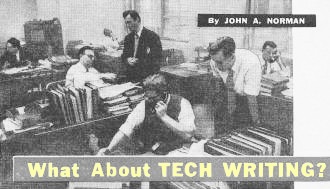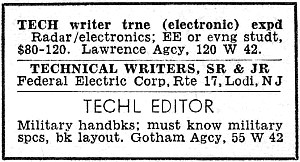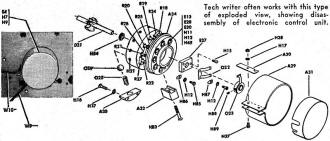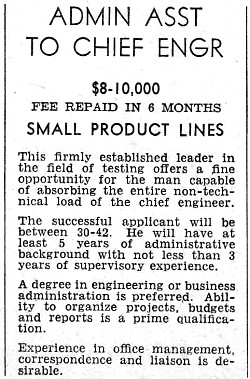What About Tech Writing?
|
|
If you have never written an article for publication, or written a technical manual for a piece of equipment, or maybe created a test procedure document for an assembly line, then it is hard to appreciate the skill needed to assimilate information into a concise, easy-to-follow missive that an audience of a targeted skill level will find useful. Deciding what information is needed and what will cause confusion due to redundancy or misinterpretation, including not just written content but illustrations and/or photographs, can cause much consternation during the creative process. Of course as we all know from having had to deal with poorly written documents, some authors either do not care or do not know how to write effectively. Competent technical writers have always been needed, and even with modern day computerization providing spelling and grammar checkers, there still is no substitute for a quality human writer. Having written hundreds of technical articles, manuals and test procedures myself, I still suffer from indecision on content and experience the foibles of relying too heavily on word processor error checking. This 1956 article from Popular Electronics magazine says a top technical writer can expect to earn $4.50 per hour ($9,360/yr.), which equates to about $101,387/yr in 2023 (BLS CPI calculator), which is a high number due to the massive inflation (9~11%) we have experienced since early 2021. What About Tech Writing? Are you qualified to fill any of these jobs? They are samples of recent openings in "technical writing" - a new, promising, and not too widely understood field. Although much of industry leans heavily on tech writers, it is safe to say that the greatest number are employed in electronics. The first ad, for instance, and the "Jr" part of the second ad call for men who have some electronic training but no definite experience in tech writing. The third ad, on the other hand, requires a man with perhaps limited electronic training but a fairly specific kind of tech manual background. What Is a Tech Writer? In the broadest sense, the technical writer translates the work or products of a specialized group into language that can be understood by the non-specialized group. A man preparing an instruction folder telling housewives how to use a new electric mixer is doing a job of technical writing. Similarly, a team of men preparing volumes on the use and maintenance of a radar system is engaged in technical writing. An assistant to a top scientist, writing a report on recent experiments to be presented to a Board of Directors, or a Pop'tronics reader sending in an item for the "Tips and Techniques" department is, in effect, doing tech writing.
Often, this part of the job is quite knotty. A sonar engineer may talk to the tech writer about a sweep circuit - but how does the writer explain this to others who may never have heard of sweep circuits? Similarly, a product engineer may explain to the writer the correct use of a wafer switch and a potentiometer with linear taper. But how does the tech writer translate these operating instructions to a lay consumer who thinks of a "wafer" as something you dip into a cup of tea, and to whom "linear taper" is a meaningless cryptogram? Part of his work, then, involves a constant search for verbal expressions and graphic symbols that can be grasped by his readers and still provide enough correct instruction for them to do the right thing at the right time with the equipment in question. What is a tech writer? Ask one in the business. He'll tell you he's a combination of many things, including analyzer of equipment and processes, student of human nature, teacher, and - of course-fast and prolific writer of clear, concise prose. Tech writer often works with this type of exploded view, showing disassembly of electronic control unit. Engineers as Writers. Often the demands of a particular technical post require that a man - engaged primarily in research or production - submit a report or other form of verbal communication regarding his work. A project engineer may have to explain how a new product works so that the advertising department can understand enough about it to write intelligent sales copy. Or a government agency - buying 5000 units - may require a handbook of instructions to accompany the product. In this case, a professional technical writer would probably be assigned to do the book, but his basic information would have to come from the project engineer. Consequently, the engineer or scientist responsible for a product or new development becomes a primary source of information about it. Communication at this level is critical to the further development of the product, its manufacture, use, and eventual maintenance in the field. One wrong - or misunderstood-phrase at this stage can produce a "snafu" at some point within the plant as well as for users of the equipment miles away and years later.
Agency director David L. Golan indicates that the title of "Administrative Assistant" could readily apply to an experienced tech writer who has managed, in the course of his job experience, to pick up various related skills in administration and budgeting. In this particular case, Golan points out: "All the non-engineering load of the chief engineer would be established by one applicant hired. Evaluating reports, preparing technical summaries, and handling correspondence would comprise about 60% of the job load." And, adds Golan, there are "many higher priced opportunities in the technical field open to tech writers with appropriate additional background." Naturally, jobs like this are not for beginners - but they represent the kind of openings that often develop for experienced men. In many situations, the requirements of good, clear communication are so great that a professional writer may be hired whose chief task is to prevent misunderstandings between engineers and executives. Diagrams, specifications, and instructions to personnel must be prepared so that their meaning is unmistakable. Whether or not the professional tech writer is used in such situations, most firms in recent years have demanded that the men they hire as engineers and technicians have at least the ability to express themselves clearly regarding their work. The need has become so great that universities have instituted special writing courses for students working toward science and engineering degrees. As Professor B. B. Gamzue of New York University puts it: "These men are finding that writing is a professional tool as valuable to them as the slide rule. By instituting the technical writing course, the engineering college has fulfilled an obligation to its students and their future employers." The "How-to-Do-It" Need. Beyond the lab report, the specialized magazine article, the formal specification, and miscellaneous intra-industry communications, is the large area of technical-instruction-writing that is more generally taken to be the domain of the full-time professional tech writer. Such a writer may be employed by the firm producing the items he writes about. Or, he may work for a large publishing house which has a technical writing division. Or, he may be on the staff of a "job-house," which specializes in technical manuals and related literature. Or, he may write courses for a technical school. Regardless of where they are employed, such writers have one job in common: telling others how to use something or how to do something. To the extent that an understanding of theory is needed for intelligent operation, the writer must also include something of the "how" and "why behind a piece of equipment or process. A tech writer's understanding of theory need not be as profound as that of the engineer's - but it must be enough to place the writer on "speaking terms" with his area of interest. A supply of such writers, plus industry's willingness to use them instead of forcing their engineers to "double in brass" is anticipated by many. Getting Started. The ground rules for getting into tech writing are still flexible; this is a relatively young field. Many start as technicians or engineers with little previous interest in writing. But most beginners with a bent for writing, plus an interest and background or training in things technical, find their way into electronics or other fields of technical and business activity. Either way, the ability to explain - in writing - accompanied by a definite liking for this kind of work are "musts." Within the area of tech writing itself, there are several specialized jobs known by different titles. A "parts lister," for example, catalogs a large piece of equipment down to its last resistor and solder lug. Painstaking and often tedious, such work has provided many with an avenue of approach to becoming full-fledged technical writers. Writers themselves are often graded as "senior" and "junior," depending on personal experience and salary earned. The writer prepares the text of a handbook or manual, confers with product engineers, researches the equipment, may run tests on it under plant supervision, and orders art work for illustrating his book. Sometimes he acts as a "project director," supervising the work of a team of writers, parts listers, draftsmen and layout artists all engaged in a series of books. When the term "editor" is employed in such a situation it can mean practically anything: the "editor" can be anyone from the general manager to a senior tech writer to a nontechnical person who scans every line for grammatical correctness and conformance to handbook requirements. This last item is of great importance, particularly in government-requisitioned manuals. There are government specifications for the manuals as well as for the equipment itself, and a handbook - regardless of how well it's written and how accurate it is technically - will be rejected if it does not present its information in the organized form demanded by the specification. Many tech writers find these demands too restrictive; when the job is voluminous and complex, the services of an editor who is a specialist at interpreting government specifications may be required. Pay and Rating. Because it's a fairly new field, salaries in tech writing vary. Generally, the beginner with no experience but some training and aptitude will start as a "trainee" and earn up to $2.00 an hour. As his experience and technical understanding grow, so do job advancement and salary. A senior writer with four or more years on the job may earn from $3.50 to $4.50 an hour. The figures vary with the type of company, the nature of the work, and the demand for and supply of writers at the time. Invariably, a man seeking a job in tech writing will be given some kind of test at his interview. He may be shown a number of standard circuits and asked to explain them. He may also be handed a poorly written paragraph and asked to rewrite it. A unique test has been developed by Emil Filepp, a Project Manager in the Technical Writing Service at McGraw-Hill Book Company, New York City. Filepp asks an applicant to write instructions on "How to Fill an Inkwell." The result, according to. Filepp, " ... is graded for spelling, punctuation, use of words, sentence structure, economy of language. In addition, it shows how well the writer can organize written material, and whether the applicant has a good feeling for equipment and an appreciation of detail." For a home test, Filepp suggests that you try writing on "How to Tie a Necktie." If someone can do the job successfully, following your written instructions, you may make a successful tech writer. Once you get your "foot in the door," you may proceed well past the threshold into a promising and lucrative career. Tech writing, itself interesting and well paying, often serves as a stepping stone to better things.
Posted January 18, 2023 |
|


 In each example, it is presumed that the writer
possesses two important qualities. He must understand the subject he is writing
about. And he must be able to express this understanding in the language, style,
vocabulary, and diagrammatic symbols common to his field and which he knows will
be grasped readily by his readers.
In each example, it is presumed that the writer
possesses two important qualities. He must understand the subject he is writing
about. And he must be able to express this understanding in the language, style,
vocabulary, and diagrammatic symbols common to his field and which he knows will
be grasped readily by his readers. 
 This ad (left) is from a recent listing made
by Suburban Employment, a New York agency specializing in electronics and engineering.
Many would consider it a "dream job" in terms of salary and promise of interesting,
stimulating work. It is a type of job not too far afield from the main area of interest
of a technical writer.
This ad (left) is from a recent listing made
by Suburban Employment, a New York agency specializing in electronics and engineering.
Many would consider it a "dream job" in terms of salary and promise of interesting,
stimulating work. It is a type of job not too far afield from the main area of interest
of a technical writer.